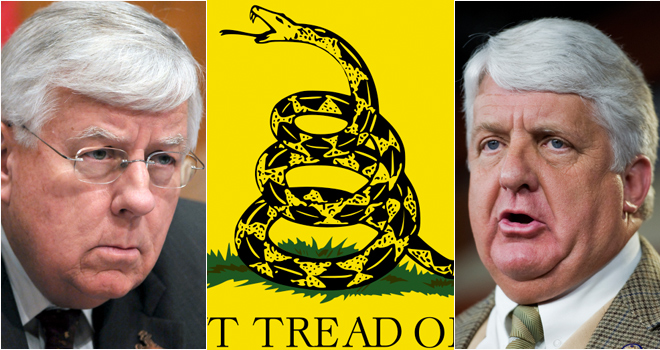Republicans say they’ve found the problem in America — and that problem is the basic framework of the Union as we know it today.
A group of Republicans in the House and Senate are proposing an amendment to the Constitution that would allow a vote by two-thirds of the states’ legislatures to override any federal law they did not agree with.
The proposed constitutional amendment, a tea party favorite, is being touted by Sen. Mike Enzi (R-WY) in the Senate and co-sponsored by Sens. John Barasso (R-WY) and Orrin Hatch (R-UT). In the House, Reps. Rob Bishop (R-UT), Morgan Griffith (R-VA) and Paul Broun (R-GA) are leading the charge.
The goal, according to proponents, is to stop the tyranny of Washington over the economy and circumscribe other federal powers.
Here’s how the plan would work, from an op-ed Bishop wrote in Daily Caller announcing the Amendment:
[I]f two-thirds of the states collectively find a federal law or regulation abhorrent or misguided, they should have the power to repeal said law or regulation. The law would then be sent back to Washington for further consideration, at which time Congress may choose not to act again on the matter, or they may vote to override the states’ repeal and pass it in finality.
“American society itself is so diverse, so organic, so varying in its geography, culture, and demographics that we see the same fatal conceit when government tries to manage it from one central location,” Bishop wrote. “That is, unfortunately, what we have done over the past 80 years.”
Supporters of the so-called Repeal Amendment say that it was the 17th Amendment, added to the Constitution in 1913, that helped lead the country down the path of too much federal power. Tea partiers have suggested repealing the 17th Amendment — which allows for direct election of senators — but Republicans have balked.
Marianne Moran, executive director of the Repeal Amendment, told TPM creating a new constitutional amendment may be easier to swallow then repealing the 17th.
“A lot of people feel that’s the way that Washington controlled much more power and took it away from the states. It’s hard to take away direct election of senators from the people, but it was the idea of the founders that give state legislators more power,” she said. “And that’s why a lot of those people who support repeal of the 17th love the idea of the repeal amendment because it’s easier to sell to a large majority of people that you’ll be able to repeal bad acts of Congress.”
The amendment will be officially rolled out Thursday in a Capitol Hill press conference. Most of the sponsors declined a request for comment from TPM Wednesday afternoon. Barasso’s office confirmed his support for the plan, but referred all specific questions to Enzi. Broun’s office referred calls to Bishop’s office. Moran told TPM her group has been working with Enzi and Bishop to introduce the new bill.
The idea that the framework of the union as we know it today should be fundamentally altered in favor of granting final veto power over federal law to states has been kicking around Republican politics for a while now. Last year, House Majority Leader Eric Cantor (R-VA) signaled his support for a plan in the Virginia legislature to call a Constitutional Convention to consider the Repeal Amendment.
Though it’s never been tried, a Constitutional Convention can be called by a vote of 2/3 of the states, triggering an amendment process. The customary way an amendment begins is with a vote in Congress that then requires ratification by the states to become part of the Constitution. Bishop last introduced his Repeal Amendment in Congress last year.
Meanwhile, GOP-controlled state legislatures have been passing their own laws aimed at knocking down the federal government’s ability to pass laws via the means laid out by the founders. More than one legislatures has considered bills allowing individual states to nullify the federal laws they don’t like, and only abide by the ones that they do.
Moran insists her scheme is drastically different from those nullification proposals, which are legally dubious at best.
“It’s completely different from nullification. This would be two-thirds of the states getting together to say we don’t like a specific law or regulation, passing a resolution to each state legislature to that effect, and then it would be null and void,” she told TPM. “It doesn’t prevent Congress from coming back the very next day and passing that same law, but considering it would take a huge majority of the American people to get two-thirds of the states to agree to an appeal, those senators and congressmen would probably no longer have their jobs come election season.”
“It’s really designed to restore the balance of power between the states and federal government that’s been usurped for a long period of time,” she said.






